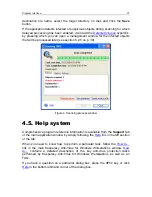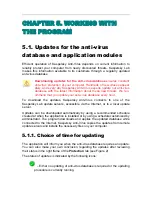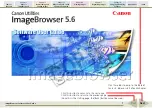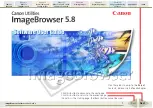
8 Kaspersky
Anti-Virus
®
5.0 for Windows Workstations
You might have noticed the following indirect symptoms point to a virus infection
on your computer:
•
Your computer freezes frequently or displays error messages.
•
Your computer slows down when programs are launched.
•
Your attempts to boot up the operating system fail.
•
Files and directories suddenly go missing or their content changes.
•
Your hard disk is accessed too often (the light below the power button
blinks).
•
Microsoft Internet Explorer "hangs" or behaves erroneously (for example,
you cannot close a program window).
•
Your computer cannot boot from the hard drive (an error message is dis-
played).
Note that 90% of such cases indicate problems with your hardware or software.
However, the remaining 10% indicate a possible infection of your computer. If
you experience any of the above symptoms, we recommend that you contact
your system administrator and conduct a comprehensive virus scan of your
computer.
2.2. What to do if you have any of
these symptoms
If you have noticed that your computer is behaving “suspiciously”:
1. Don’t panic! This golden rule prevents you from unnecessary stress
and helps you save important data stored on your computer.
2. If you cannot boot from the hard drive (your computer gives you an
error message when you are starting the system), try to start the
system in safe mode or from the Windows boot disk that you
created during installation of the operating system on your
computer.
3. Before taking any actions, back up all critical data on an external
storage device (floppy disk, CD, flash card, etc.).
4. Install Kaspersky Anti-Virus, if you have not yet installed it.









































